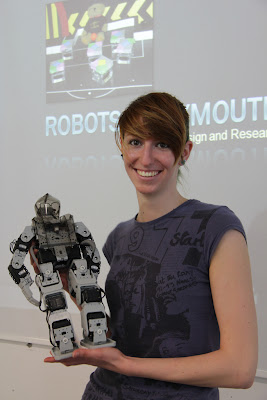 For me, it's time to start reflecting on this year's Plymouth e-Learning Conference. I'm incredibly tired and slept like a brick last night, but I awakened very satisfied at the level of success we achieved with this year's conference. With 218 delegates registered from 17 different countries, I think it is safe to say that PeLC has staked its claim on the international e-learning conference map. When I have trawled around a little over the next few days, I will compile a showcase of all those pictures, blogs and other web artefacts related to the conference.
For me, it's time to start reflecting on this year's Plymouth e-Learning Conference. I'm incredibly tired and slept like a brick last night, but I awakened very satisfied at the level of success we achieved with this year's conference. With 218 delegates registered from 17 different countries, I think it is safe to say that PeLC has staked its claim on the international e-learning conference map. When I have trawled around a little over the next few days, I will compile a showcase of all those pictures, blogs and other web artefacts related to the conference.The conference theme worked well I think. Crossing Boundaries certainly lived up to its promise, and clearly resonated with most of those present at the event. The choice of keynote speakers was also spot on. Mike Blamires set the scene perfectly with his Day 1 presentation on educational boundaries entitled 'Children grow to fill the spaces we create for them' and managed to engage all of his audience through interactive workshop style activities and rich feedback. Here is the link to the video of Mike Blamires keynote speech with a welcome from Michael Totterdell, Pro-vice Chancellor of the University of Plymouth.
Graham Attwell spoke on Day 2 in his normal controversial and anarchic style and challenged the audience to re-evaluate what they considered to be best practice in education. Here is the video of his keynote speech, complete with questions from the audience. Both keynote speakers promoted much debate from those present during ensuing sessions, and also evoked a storm of tweets from inside and outside the venue. At one point on Firday morning #pelc09 trended on Twitter at No 3, and some reports say it even reached as high as No. 2 for a short while at least.
The catering was praised too - the Devon Cream tea went down well as usual and the local produce buffets were very good. Only the quality of the coffee was criticised and even then only in a good humoured way. But I take these criticisms seriously and I will see what I can do about that next year at PeLC 2010, I promise.
The venue was appreciated by just about everyone - the Roland Levinsky building is a masterpiece of engineering and design, and with its contemporary art gallery attached and open to all, provided some welcome distractions just when they were needed. Technically there were some issues, but as with all conferences of a technical nature we became something of a hostage to fortune, and I know things will be better next year.
The quality of the 80 papers and workshops was high - everyone I spoke to remarked that the presentations were engaging, rooted in sound theory and offering excellent case studies and research data in support. State of the art demonstrations such as the 3D Visual Immersion Cinema were very well received prompting some delegates to discuss their experiences for hours afterwards. The crowning glory for some, experience wise at least, was the choice of the National Marine Aquarium as our conference dinner venue. A splendid spectacle it was, with stunning views of the huge aquarium tanks containing sharks, sea turtles and other aquatic life, and the food and service were most excellent too.
As conference chair I would like to thank all those who took part, either as presenters or simply attendees at the conference. I would also like to thank my admin, technical and reception support teams, and the student ambassadors who played such a key role in the success of PeLC09. The review panel who did a tremendous job sorting through and selecting the best papers from all those that were submitted deserve a vote of thanks, as do the organising committee who worked hard to ensure the event was successful. A special big up for our designer Mark Lyndon whose stunning images graced our publicity materials and website - thanks Mark. Lastly, a special mention for my co-chair Mark Townsend, who will be leaving us this year and for whom this will be his last conference. We will all miss you greatly Mark, and we wish you every success in the next chapter of your career. Here's to PeLC 2010 - Learning without Limits! See you in Plymouth on April 8-9, 2010.
My PeLC picture collection
James Clay's PeLC picture collection
Peter Micheuz's PeLC picture collection





















